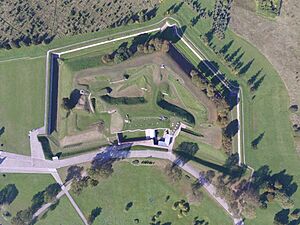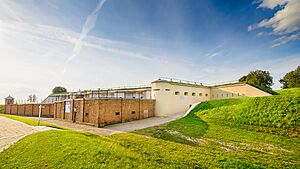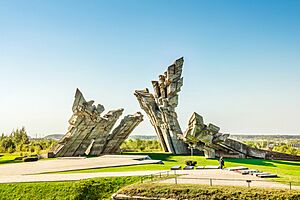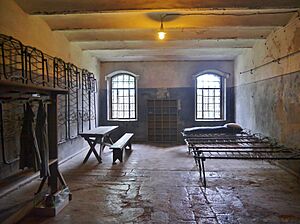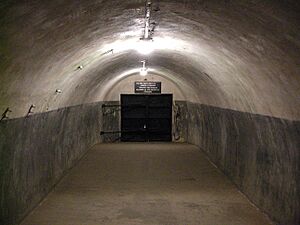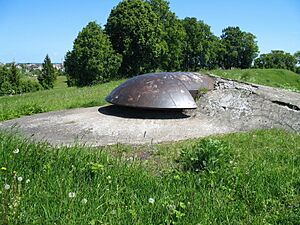Ninth Fort facts for kids
The Ninth Fort (which in Lithuanian is called Devintas Fortas) is a large, strong building in Kaunas, Lithuania. It's like a historical fortress. This fort was built a long time ago, in the late 1800s, as part of the Kaunas Fortress to protect the city. Over the years, it has been used for different things. During one period, it was a prison and a place where prisoners were held before being sent to faraway labor camps. Later, during another difficult time, it became a site where many people, including Jewish people and captured soldiers, lost their lives. Today, the Ninth Fort is a museum and a memorial, helping us remember its important and often sad history.
Contents
What is the Ninth Fort?
Building a Stronghold
At the end of the 19th century, the city of Kaunas needed strong defenses. So, people built many forts and gun batteries around it. By 1890, there were eight forts and nine gun batteries. The Ninth Fort was the last one to be built. Its construction started in 1902 and finished just before World War I began. From 1924, the Ninth Fort served as a prison for the city of Kaunas.
A Place of Imprisonment
During the Soviet occupation of Lithuania from 1940 to 1941, the Ninth Fort was used by the NKVD. This was a Soviet secret police organization. They kept political prisoners here. These prisoners were waiting to be sent to harsh labor camps called Gulags.
A Site of Tragedy
Later, during the occupation of Lithuania by Nazi Germany, the Ninth Fort became a place of terrible events. Between 45,000 and 50,000 Jewish people were brought here. Most of them were from Kaunas, especially from the Kovno Ghetto. They were tragically killed by Nazis and their helpers from Lithuania. This sad event is known as the Kaunas massacre of October 29, 1941.
Jewish people from other countries like France, Austria, and Germany were also brought to Kaunas. They too were executed at the Ninth Fort. In 1943, German forces made special groups of Jewish prisoners. These groups had to dig mass graves and burn the bodies. One group of 64 people bravely managed to escape the fortress on New Year's Eve of 1944.
As Soviet forces returned that year, the Germans closed the ghetto. They also emptied what had become known as the "Fort of Death." The remaining prisoners were sent to other camps. After World War II, the Soviets used the Ninth Fort as a prison again for a few years. From 1948 to 1958, it was used to manage farm organizations.
The Ninth Fort Museum
Exploring History
In 1958, a museum was created at the Ninth Fort. The next year, an exhibition opened in four cells. It showed the terrible things that happened in Lithuania during the Nazi war. In 1960, people started to find, list, and study the places where mass killings occurred.
The Ninth Fort museum today holds many historical items. These items tell stories about both the Soviet period and the Nazi genocide. There are also things related to the earlier history of Kaunas and the fort itself. Most of the displays have labels in English, so visitors can understand them easily.
The Memorial at Ninth Fort
Remembering the Victims
A special memorial stands at the Ninth Fort in Kaunas. It honors the victims of Nazism. The sculptor A. Ambraziunas designed this monument. It was put up in 1984 and stands 105 feet (32 meters) tall.
The place where many victims were buried is now a grassy field. A simple but clear memorial marks this spot. It has words written in several languages. The message says, "This is the place where Nazis and their assistants killed more than 30,000 Jews from Lithuania and other European countries." It helps everyone remember the tragic events that happened here.
See also
 In Spanish: Fuerte Noveno para niños
In Spanish: Fuerte Noveno para niños
 | Aaron Henry |
 | T. R. M. Howard |
 | Jesse Jackson |


